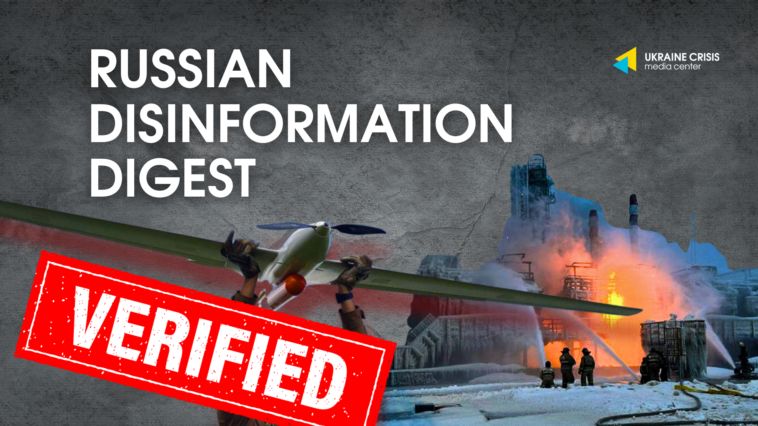Written by Anton Khimiak, HWAG/UCMC analyst
Propaganda Digest: This is our weekly analysis that exposes the most exaggerated, misleading, and outrageous rhetoric from recent Russian media sources, aimed at promoting critical thinking to better debunk the manipulation of Russian propaganda.
Find more Verified Digests here
On the night of January 21, production facilities in the commercial sea port of Ust-Luga, Russia, were attacked by two drones
Recently, the Defence Forces of Ukraine carried out drone strikes on objects in the Leningrad (Ust-Luga) and Tula (Tula) regions. These strikes caused a particular stir in Russian social networks because, in the case of the explosions in Ust-Luga, the drones flew approximately 900 kilometres over Russian Federation territory before hitting the target. This blatant failure of Russian air defence serves as an excellent case to show how the Russian authorities and propagandists react to such “emergencies”.
Russian Narrative 1 : Refusal to Accept
Sergey Karnaukhov, Russian propagandist (131,969 subscribers), Telegram Channel:
“The fire occurred at the terminal of the Novatek company in the port of Ust-Luga, Leningrad region. There were no casualties, Governor Drozdenko said.”
Amir Valiev, a Russian developer and operator of UAV systems:
“That the same UAV could overcome the Bryansk, Smolensk, Tver and Novgorod regions and get to us is incredible. Theoretically, the UAV could be launched from Finland. In principle, you can fly very low over water.”
Verified: Russian propaganda has long been famous for exaggerating Russia’s military industrial complex capabilities and weapons arsenal. For years, the Russians paid a lot of attention to the PR of their air defence systems, such as the S-300, S-400, Pantsir-S, and other surface-to-air missile platforms.
It is for this reason that successful Ukrainian drone attacks leave the Kremlin’s mouthpieces no choice but to either downplay the effectiveness of the attacks or to question their origin. Russian authorities avoid the words ‘attack’ and ‘explosion’, opting for the ambiguous option, calling it a ‘clap’. This reduces the likelihood of ‘awkward’ questions from the domestic audience and deliberately refuses to reflect reality.
In another case, the Russian mass media resort to the Kremlin’s narrative, as if the war is waged against NATO, not Ukraine. Consequently, Russia downplays the air defence ability to defend its cities from precisive and highly technological western weapons. Thus the Kremlin does not want to admit that Ukraine can strike so deep into Russian territory.
Russian Narrative 2 :Shift of Accents
ZeRada (398,543), Telegram Channel:
“It is obvious that Ukraine has been stockpiling drones to intensify attacks, possibly due to changes in [political] power. [Drone] strikes raise Budanov’s (Chief of the Defence Intelligence of Ukraine) rating”.
Legitimnyi (1,063,880), Telegram Channel:
“According to our data, Zelensky ordered the intensification of military operations and the Ukrainian crisis so that it would remain in the news pages at a moment when the fate of billions of credits for Ukraine will be decided in the United States and the EU. That is why they are hitting the infrastructure on Russian territory en masse. Bankova [Ukrainain government] is provoking a response from the Russian Federation in Ukraine to use it for information noise”.
Verified: Above are quotes from propaganda Telegram channels trying to impersonate Ukrainian analysts. Their publications are aimed primarily at Ukrainian and Russian audiences and are primarily intended to destabilise the situation in Ukraine. These channels systematically spread news bordering on conspiracy theories and outright manipulation.
Regarding the topic of our digest, the ZeRada channel resorted to completely unsubstantiated statements about potential changes in the Ukrainian government. The channel promotes this narrative to set Ukrainian citizens against the authorities and shift the focus from a successful attack on a Russian enterprise to internal political disputes.
Moreover, Russians are trying to push the notion that the Ukrainian government does not achieve military goals with its strikes on Russian territory and thus only provokes the Kremlin to commit new war crimes. The Kremlin’s propaganda repeatedly claims that Kyiv is interested in the destruction of its population.
Russian Narrative 3 Mobilisation and Escalation
Overclockers.ru:
“It is obvious that, in addition to continuing attacks on military-industrial facilities in Ukraine, the Russian Armed Forces should pay attention to other ways in which attack drones enter the Armed Forces of Ukraine, namely, on the routes of communication between Western countries and Ukrainian warehouses. The destruction of such routes and warehouses will show foreign suppliers that all their assistance is almost guaranteed to turn into a pile of metal, and continued supplies make no sense”.
Elder Edda (571,772), Telegram Channel:
“What should we do in this situation?… Unfortunately, now electronic warfare systems should become an integral part of any large industrial/infrastructural facility: factory, power plant, train station, and so on”.
Verified: One of the classic tasks of propaganda is mobilising the population for the sake of struggle or a specific joint activity. In the case of strikes by Ukrainian drones, Russia tries to “unite the population against a common enemy” and channel their discontent to cover up security problems.
Such mobilisation is also achieved by escalating the global conflict between Russia and the West. The call to strike logistical routes with Western partners could significantly deepen the tension between the Russian Federation and NATO.
Ultimately, channels like Z-war correspondents aimed to maximise the effectiveness of government and military institutions to achieve war goals. Such calls for improvements in the field of defence mobilise people to take actions that become the basis of a criminal regime.


